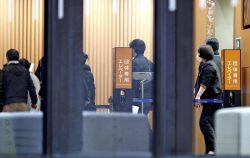Medical Device Maker ‘Gifted’ Hospitals, Doctors Millions of Yen; Money Said to Be Given for Studies Not Conducted
19:28 JST, August 26, 2024
A Tokyo-based medical device maker gave about ¥120 million in cash to 42 medical institutions and universities around the nation as well as 37 doctors to whom it sold its products, according to an investigation by the Japan Fair Trade Council of the Medical Devices Industry. The cash was reportedly given out from fiscal 2018-22 for postmarket studies that were never performed.
The investigation revealed that Zeon Medical Inc. gave out the cash to boost its sales, highlighting the hidden flow of funds from the vendor to medical experts.
In September last year, the Metropolitan Police Department arrested Noboru Yanagida, 68, a former president of Zeon Medical, for allegedly offering a bribe of about ¥3.2 million to Yusuke Hashimoto, a former doctor at the National Cancer Center Hospital East in Kashiwa, Chiba Prefecture, in exchange for favorable treatment for the company. Hashimoto was also arrested on a bribery charge.
Yanagida and Hashimoto were later indicted for the alleged bribe, made under the guise of a reward for postmarket studies, which verify the safety and quality of medical devices sold by a company.
In response to the bribery case, the council conducted an investigation into Zeon Medical from around March to June. It found that the company had provided cash to medical institutions, universities and doctors it had sold its products to. In these cases, too, the money was provided ostensibly as a reward for their cooperation in conducting studies, though such studies were never done. The practice was reportedly called “pseudo postmarket studies” and used to increase sales for its products.
The council confirmed that ¥37 million was provided to 39 medical institutions, including 10 hospitals run by public or independent administrative institutions, in 141 cases and about ¥1 million to two national universities and one private university in three cases from fiscal 2018 to fiscal 2022.
Thirty-seven doctors were also confirmed to have received about ¥81 million in total in 220 cases.
Although five of the 37, including Hashimoto, were working at public hospitals during the period, the MPD is believed to have decided not to build a bribery case against the remaining four based on their employment status at the time.
The council provides rules on how medical devices should be marketed, which are approved by the Consumer Affairs Agency and the Japan Fair Trade Commission.
Providing money to doctors and medical institutions does not constitute bribery if the recipients are private entities or doctors at private hospitals.
However, there was concern the practice violated the law against unjustifiable premiums and misleading representation, which regulates inappropriate influence on customers. On Monday, the council issued a stern warning to Zeon Medical, finding its practice to constitute a violation of its rules.
Zeon Medical is a subsidiary of Zeon Corp., a chemical manufacturer listed on the Tokyo Stock Exchange’s top-tier Prime section. According to a private credit checking firm, Zeon Medical manufactures and sells medical devices mainly for digestive and circulatory systems, and had sales of ¥3.8 billion in the fiscal year ended March 31, 2023.
Top Articles in Society
-

Producer Behind Girls Group XG Arrested for Cocaine Possession
-

Man Infected with Measles Reportedly Dined at Restaurant in Tokyo Station
-

Man Infected with Measles May Have Come in Contact with Many People in Tokyo, Went to Store, Restaurant Around When Symptoms Emerged
-

Woman with Measles Visited Hospital in Tokyo Multiple Times Before Being Diagnosed with Disease
-

Australian Woman Dies After Mishap on Ski Lift in Nagano Prefecture
JN ACCESS RANKING
-

Japan PM Takaichi’s Cabinet Resigns en Masse
-

Japan Institute to Use Domestic Commercial Optical Lattice Clock to Set Japan Standard Time
-

Israeli Ambassador to Japan Speaks about Japan’s Role in the Reconstruction of Gaza
-

Man Infected with Measles Reportedly Dined at Restaurant in Tokyo Station
-

Videos Plagiarized, Reposted with False Subtitles Claiming ‘Ryukyu Belongs to China’; Anti-China False Information Also Posted in Japan




















